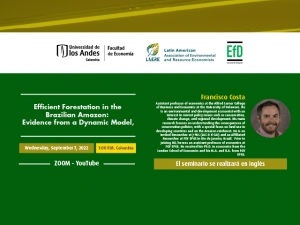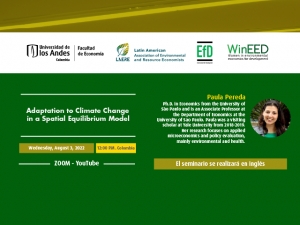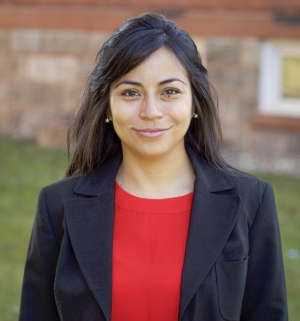Manuela Fonseca
Management of common pool resources in a nation-wide experiment
Jean-Christian Tisserand, Astrid Hopfensitz, Serge Blondel, Youenn Loheac, César Mantilla, Guillermo Mateu, Julie Rosaz, Anne Rozan, Marc Willinger, Angela Sutan
Ecological Economics 201, 107566
Economic impacts of agricultural policy responses to the outbreak of COVID-19
D. Jiménez, A. Saldarriaga-Isaza
Estudios Gerenciales 38 (163), 200-210
Review of the social and economic dynamics under Colombian mining policy: Cursing the blessing?
A. Saldarriaga Isaza
Journal of International Development
Thermal districts in Colombia: Developing a methodology to estimate the cooling potential demand
JP Ríos-Ocampo, Y Olaya, A Osorio, D Henao, R Smith, S Arango-Aramburo
Renewable and Sustainable Energy Reviews 165,112612
The effects of high penetrations of renewable energy sources in cycles for electricity markets: An experimental analysis
Jessica Arias-Gaviria, Santiago Arango-Aramburo
Energy Policy 166, 113014
Forest fires and impacts of COVID-19 lockdowns on air quality in four Latin American megacities
Jorge A Bonilla
Environmental Research Letters 17 (10)
LAERE-EfD Seminar | Efficient Forestation in the Brazilian Amazon: Evidence from a Dynamic Model
Zoom
Inscripciones aquí| Register here
Live transmission: https://youtu.be/5V5d8otQI1U
Francisco Costa is an assistant professor of economics at the Alfred Lerner College of Business and Economics at the University of Delaware. He is an environmental and development economist with an interest in current policy issues such as conservation, climate change, and regional development. His main research focuses on understanding the consequences of conservation policies, with a special focus on land use in developing countries and on the Amazon rainforest. He is an Invited Researcher at J-PAL (LAC & K-CAI) and an Affiliated Researcher at FGV EPGE in Rio de Janeiro, Brazil. Prior to joining UD, he was an assistant professor of economics at FGV EPGE. He received his Ph.D. in economics from the London School of Economics and his M.A. and B.A. from FGV EPGE. Webpage: https://sites.google.com/site/fjmcosta/
Abstract: This paper estimates the Brazilian Amazon’s carbon-efficient forestation -- i.e. when farmers internalize the social cost of carbon. We propose a dynamic discrete choice model of land use and estimate it using a panel of land use and carbon stock of 5.7 billion pixels between 2008 and 2017. Business-as-usual implies an inefficient release of 44 gigatons of CO2 in the long run resulting from deforestation of an area twice the size of France. We find that relatively small carbon taxes can mitigate a substantial part of inefficient deforestation. We show that targeted mitigation efforts in areas with the largest potential for emission reductions can be very effective. We also find that while taxing cattle production can abate emissions, taxing crops is virtually innocuous
LAERE-EfD Seminar | Adaptation to Climate Change in a Spatial Equilibrium Model Confirmation
Zoom
Inscripciones aquí| Register here
Live transmission: https://youtu.be/nbXh2Rbvjnc
Paula Pereda holds a Ph.D. in Economics from the University of São Paulo and is an Associate Professor at the Department of Economics at the University of Sao Paulo. Paula was a visiting scholar at Yale University from 2018-2019. Her research focuses on applied microeconomics and policy evaluation, mainly environmental and health.
Abstract: Climate change forecasts for Brazil points to sizable and spatially heterogeneous changes in temperature. This is likely to spur migration and spatial changes in crop patterns. We develop a unique tractable model that integrates both migration and agricultural adaptation as responses to climate change. Our model considers that workers' locational choice is impacted by climate change through three channels: a direct amenity-value channel, as well as the indirect agricultural wages and housing prices channels. The impacts from indirect channels are affected by how farmers adapt to the new climate. Our simulations predict up to an $18.25\%$ increase in micro-region migration rates, with barely no effect from crop change. On the other hand, agricultural adaptation has important impacts on employment in agriculture. The South macro-region is predicted to have an increase in agriculture share of employment when farmers change crop patterns, this includes a reduction in agriculture area dedicated to the production of Maize and an increase in the area dedicated to Coffee in the region. Our results help to identify populations most vulnerable to climate change and the regions where most gains from agricultural adaptation may come from.
Julián Gómez
Soy profesor de cátedra la Facultad de Administración de la Universidad de los Andes en las maestrías de Gerencia del Desarrollo y de Regeneración y Sostenibilidad. Realicé estudios de pregrado y maestría en economía en la misma Universidad. He trabajado como investigador y consultor para Journal de Business History, la red de investigación Environment for Development (EfD), el Centro Agronómico Tropical de Investigación y Enseñanza (CATIE) Costa Rica, Luxon Consulting Group, la Corporación Manos Visibles, el Centro de Estudios sobre Desarrollo Económico y la Facultad de Administración de la Universidad los Andes.
Particularmente, he investigado los determinantes de la adopción de energías renovables entre países, los impactos de variaciones en el clima sobre el desempeño y acumulación de capital humano de los estudiantes de primaria y secundaria en Colombia, los cambios en el bienestar social generados por la economía digital en América Latina, y rol del cambio tecnológico en el sector servicios como un determinante de la desindustrialización global. Mis temas de investigación son economía ambiental, cambio climático, el desarrollo económico, la educación, y la innovación y cambio tecnológico.
Actualmente trabajo en la Facultad de Administración de la Universidad de los Andes como coordinador del proyecto financiado por el Environmental Defense Fund (EDF), que tiene como objetivo integrar programas de reducción de deforestación REDD+ jurisdiccionales con el diseño del sistema de comercio de emisiones (ETS) en Colombia
Nathaly Rivera
Nathaly Rivera es Profesora Asistente en el Departamento de Economía de la Universidad de Chile e Investigadora Asociada de EfD Colombia. Tiene un Doctorado en Economía Agrícola, Alimentaria y de Recursos de la Universidad Estatal de Michigan.
Sus intereses de investigación se relacionan con las disfunciones ambientales, los mecanismos de política para frenar la contaminación ambiental (principalmente la contaminación del aire local) y los impactos de las industrias extractivas en el bienestar local. En su agenda de investigación actual, también explora la economía de las tecnologías verdes como la energía renovable.



